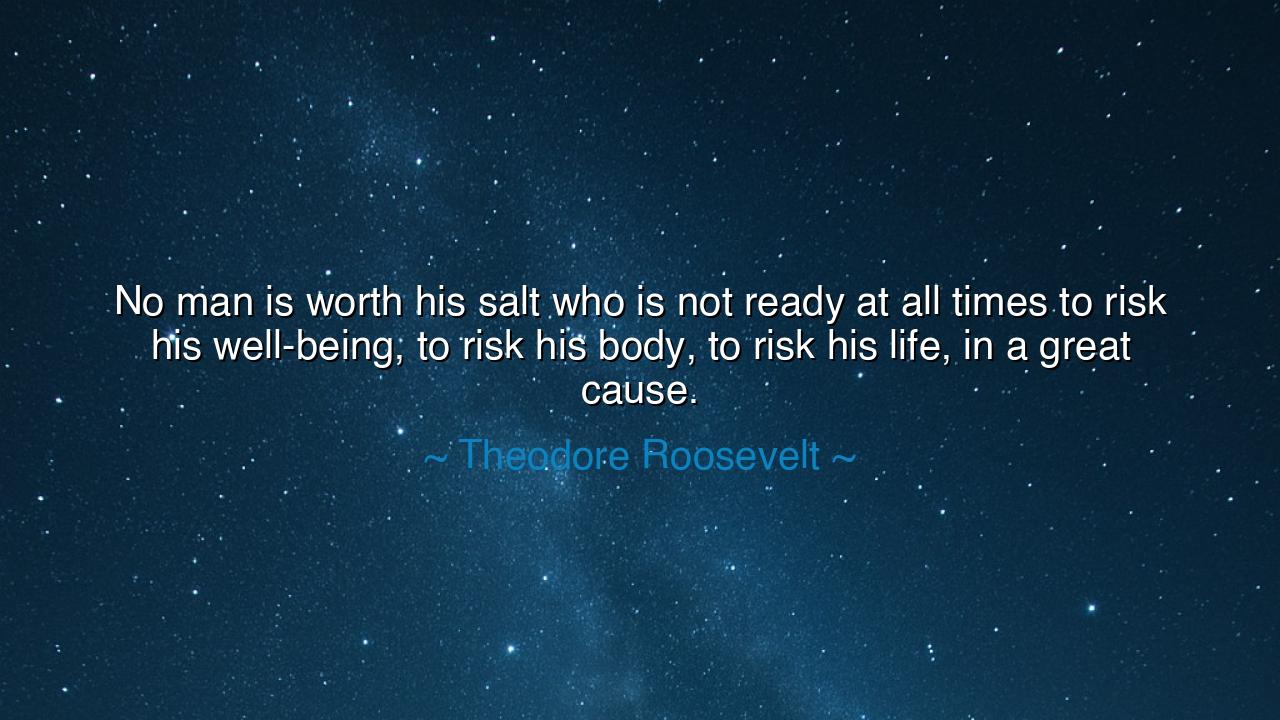
No man is worth his salt who is not ready at all times to risk
No man is worth his salt who is not ready at all times to risk his well-being, to risk his body, to risk his life, in a great cause.






The great warrior-statesman Theodore Roosevelt, whose spirit burned with courage and conviction, once declared: “No man is worth his salt who is not ready at all times to risk his well-being, to risk his body, to risk his life, in a great cause.” These words, fierce and immortal, summon the soul to action. They speak not only of physical bravery but of moral fortitude—the readiness to sacrifice comfort, safety, and even life itself for something greater than self. Roosevelt, who lived by this creed, reminds us that the measure of a person is not in what they gain, but in what they are willing to give for truth, honor, and the good of others.
This quote springs from the essence of Roosevelt’s life. A man of immense energy and vision, he was no idle philosopher. He lived his beliefs upon the battlefield and in the arena of public service. During the Spanish-American War, he led the Rough Riders up the slopes of San Juan Hill, not from behind but at the front, with bullets tearing the air around him. In politics, he waged just as fierce a battle—against corruption, injustice, and complacency. To him, the phrase “worth his salt” was an ancient measure of virtue; it harkened back to the days when soldiers were paid in salt, a symbol of value and endurance. A man’s “salt,” then, was his worth—his courage to stand for what is right, even when the cost was dear.
The heart of Roosevelt’s declaration lies in the idea of the “great cause.” It is not the reckless pursuit of danger he glorifies, but the noble readiness to face it for a righteous purpose. Whether that cause be the defense of one’s country, the pursuit of justice, or the protection of the weak, a person proves their worth only when they are willing to risk themselves for it. The ancients would have called this virtue arete—the excellence of soul that arises when action aligns with honor. To live in comfort without conviction, to seek peace without purpose, is to live half a life. True greatness demands courage, and courage demands sacrifice.
History overflows with examples that reflect this truth. Consider Mahatma Gandhi, who risked not only his health but his very life to stand against the tyranny of colonial rule. His weapon was not the sword but the steadfast will; yet every march, every fast, every imprisonment was a battle in the service of a great cause—freedom through peace. Or think of Harriet Tubman, who risked capture and death again and again to lead others from slavery to liberty. In each of these figures lives Roosevelt’s ideal: that a life of safety without purpose is a life unworthy of its breath.
Roosevelt’s words also echo in the spirit of those who serve not in war or revolution, but in the quiet heroism of daily life. The teacher who defends truth in a time of lies, the doctor who risks their health to save others, the parent who sacrifices for their child—all partake in the same sacred courage. For the “great cause” is not always grand in appearance. Sometimes it is the simple, steadfast choice to do what is right when it would be easier to turn away. In every act of selfless service, no matter how small, the salt of worth is revealed.
This philosophy also carries a warning: a life ruled by fear or self-preservation soon loses its dignity. The one who refuses all risk in the name of comfort slowly forgets what it means to be alive. Roosevelt’s era was one of conquest and hardship, yet his insight remains eternal. To be human is to struggle—to face trials that test our mettle, to engage with life as warriors of purpose rather than spectators of ease. Greatness demands risk, and risk gives birth to meaning. The cause may vary, but the courage must be constant.
The lesson is clear and enduring: do not flee from the hardships that accompany noble purpose. If your heart is called to something just, do not hesitate because it is difficult or dangerous. For it is through difficulty that the soul is tempered, as steel is forged by flame. Practical action: find the great cause that stirs your spirit—whether it be the pursuit of truth, the defense of the innocent, or the betterment of your community—and commit to it with full heart. Let your actions prove your worth, not your words.
Thus, when Roosevelt declared, “No man is worth his salt who is not ready at all times to risk his well-being, to risk his body, to risk his life, in a great cause,” he was not speaking only to soldiers, but to all humanity. He was reminding us that life’s greatest glory lies not in comfort, but in courage; not in preservation, but in purpose. To live bravely, to serve something greater than oneself—this is the salt that gives life its savor, and the soul its immortality.






AAdministratorAdministrator
Welcome, honored guests. Please leave a comment, we will respond soon